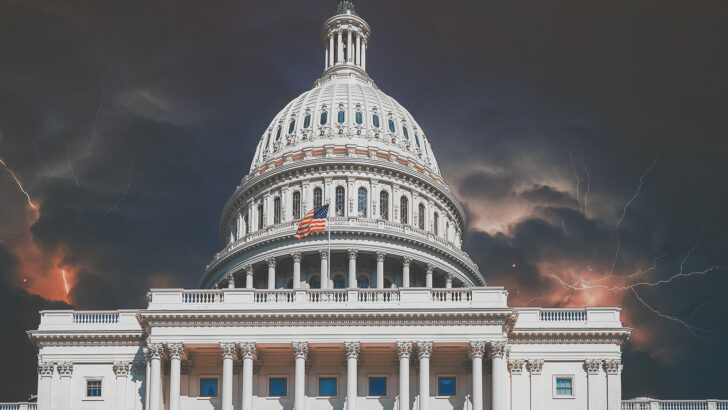Democracy and solidarity: On the cultural roots of America’s political crisis
James Davison Hunter (Yale University Press, £30.00 / €36..00 / US$40.00 )
Some years ago, three married couples from Texas, USA, contacted us. They were touring Ireland in pursuit of their ancestors. They thought that we might be a branch of one of their family’s tree. It turned out that this was not the case. Nonetheless, we enjoyed an evening in their company.
As they talked about their families and their engagements with their community, it was clear that they were decent folk, generous in their giving, considerate in their dealings and up-right in their morals.
When they discussed politics, a less attractive picture emerged. They were ‘Tea Party’ Republicans. It was not so much the policies they championed, as the paranoia and hostility that infused their discussion that dismayed. They were embattled warriors in a melodrama where good fought evil with no compromise possible.
Disjunction
This disjunction between the local and national stages is not surprising. The local with its face-to-face engagements, its clear interdependencies, where contributions to the common good are visible, allows the virtues of our visitors to flourish.
When we move beyond the local to the national, matters become more complicated as we must engage with more abstract realities. We rely on the culture that scripts our politics as we navigate to protect our interests and pay our dues to the commonwealth.
The solidarity that contains conflicts and is essential to democracy, evaporates, denying decent people, decent politics”
Even from a distance, it is obvious that the USA’s political culture is disordered; how else to explain a presidential contest between a felonious Trump and a befuddled Biden?
The antagonism, the contempt for rivals that we observed in our visitors has deepened and spread. The solidarity that contains conflicts and is essential to democracy, evaporates, denying decent people, decent politics. This important study tells the story of how this has come to be.
Dr. Hunter, Professor of Religion, Culture, and Social Theory, tells us that the picture that frames US politics is a hybrid that joins the aspirations of the Enlightenment with the inspiration of a Calvinist Christianity.
Progress
The former gave the founders the promise of progress directed by reason that escaped the trammels of superstition to win freedom from the dogmas imposed by a tyrannical authority. The latter gave meaning and motivation.
The resources found in this picture shaped the politics that directed US history.
This was not the realisation of a blueprint. It was a dynamic process in which the elements were modified and the balance among them changed as problems emerged.
Consider the more serious problems. Slavery was embedded into the fabric of the economy of the southern states, important then for the whole nation’s economic well-being. How could this abomination be reconciled with the Declaration of Independence’s claim that ‘all men were created equal’.
Who should be welcomed as immigrants? Surely not Catholics. They were dangerous aliens thanks to their attachment to a pre-enlightenment, authoritarian church with global ambitions”
All nations need boundaries as well as borders. Who belongs ‘inside’, who belongs ‘outside’? By what right were Native Americans shunted into reservations, their land stolen.
Who should be welcomed as immigrants? Surely not Catholics. They were dangerous aliens thanks to their attachment to a pre-enlightenment, authoritarian church with global ambitions. Yet they arrived in their millions; their contribution to economic development enormous.
Difficulties
Hunter traces how the picture changed and evolved in the face of these difficulties. It is an enthralling story, told with nuance, drawing on a wide range of sources. As with all human stories it has its dark episodes. Nonetheless, it provided a narrative pointing towards a better nation, more secure, more just, closer to the ideals of the Declaration of Independence.
I write ‘provided’ not ‘provide’, for Hunter grimly concludes that the picture has dissolved and the narrative is undone.
The belief in reason has been shaken and the possibility that disputes could be settled in arguments disappears. This is most clearly seen in disputes about morals, as Alasdair McIntyre pointed out in After Virtue (1981). The accuracy of his analysis becomes, Hunter reports, increasingly clear.
More generally, the idea that foundations could be found for the authority of reason is challenged. When argument is pointless, the constraints on libido dominandi. or a lust for power, so acutely analysed by Augustine, weaken, and politics reduces to the play of power. Hunter identifies authoritarian tendencies on both left and right.
The belief in God that united citizens in a mission that was both political and providential has been displaced by secularism, even if it persists, albeit with diminishing presence, at the local level.
It is hard not to conclude that the Enlightenment together with its partner, the Protestant Reformation, has run out of road”
Eisenhower recognised the binding power of religion when he, famously, observed ‘our form of government has no sense unless it is founded on a deeply felt religious faith, and I don’t care what it is.’ As the binding loosens, citizens retreat to find an identity in groups whose boundaries are drawn in hostility to other groups. The result is not pleasant.
It is hard not to conclude that the Enlightenment together with its partner, the Protestant Reformation, has run out of road. The partnership that gave us both democracy and capitalism whose benefits are considerable, no longer pays dividends.
We might console ourselves with the thought that there are other traditions of thought and other more ancient, still vibrant, forms of Christianity. It is time to explore their resources to find a way to maintain the benefits while reducing the costs.


 The United States Congress in the gathering gloom of a divided nation
The United States Congress in the gathering gloom of a divided nation 